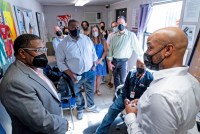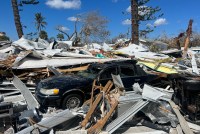Doctors Hesitate to Ask About Patients’ Immigration Status Despite New Florida Law
Florida’s new immigration law requires hospitals to ask patients about their immigration status at admission and in emergency rooms, and report that information plus the cost of care for residents without legal status. Doctors and nurses who oppose the policy seem reluctant to criticize lawmakers for fear of political retribution.
Familias huyen de los estados que niegan atención de salud a las personas trans
Más de una cuarta parte de los adultos trans encuestados por KFF y The Washington Post a fines del año pasado dijeron que se mudaron a otro vecindario, ciudad o estado en busca de un ambiente más tolerante.
Medical Exiles: Families Flee States Amid Crackdown on Transgender Care
As more states restrict gender-affirming care for transgender people, some are relocating to more welcoming destinations, such as California, Illinois, Maryland, and Nevada, where they don’t have to worry about being locked out of medical care.
Fraudsters Are Duping Homeless People Into Signing Up for ACA Plans They Can’t Afford
Homeless people are being fraudulently enrolled in health plans on the Affordable Care Act’s marketplace, induced with cash payments from insurance agents and brokers. Those who sign up for an ACA plan are disqualified from other forms of free and low-cost care and risk disruption in treatment.
How a 2019 Florida Law Catalyzed a Hospital-Building Boom
In Wesley Chapel, Fla., near Tampa, residents will soon have three general hospitals within a five-minute drive. The new construction is part of a hospital-building boom across Florida unleashed almost four years ago, when the state dropped a requirement that companies obtain government approval to open new hospitals.
¿Se podrá cumplir con la meta de terminar con la epidemia de VIH para 2030?
Debido a las interrupciones de la pandemia, los funcionarios federales no han tenido estimaciones sólidas de nuevas infecciones o el número de personas que viven con VIH desde finales de 2019.
US Officials Want to End the HIV Epidemic by 2030. Many Stakeholders Think They Won’t.
The federal government’s ambitious plan to end the HIV epidemic, launched in 2019, has generated new ways to reach at-risk populations in targeted communities across the South. But health officials, advocates, and people living with HIV worry significant headwinds will keep the program from reaching its goals.
ER’s Error Lands a 4-Year-Old in Collections (For Care He Didn’t Receive)
A Florida woman tried to dispute an emergency room bill, but the hospital and collection agency refused to talk to her — because it was her child’s name on the bill, not hers.
El forense del condado de Miami-Dade ha documentado casi tres docenas de muertes de pacientes de cirugía estética desde 2009, de los cuales 26 fueron consecuencia de un levantamiento de glúteos brasileño.
Shaved Costs, High Risk, Maximum Profits: Regulators Worry About Florida’s Butt Lift Boom
Social media marketing lures people to South Florida’s lucrative cosmetic surgery scene with the promise of cheap Brazilian butt lifts. But some researchers, patient advocates, and surgeon groups say that the risks of the procedure are generally not understood by prospective patients, and that an unsafe number of surgeries can be performed per day in office settings, maximizing profits.
Why Medicaid Expansion Ballots May Hit a Dead End After a Fleeting Victory in South Dakota
Since 2017, Medicaid expansion has been adopted in seven states where a question was placed directly on the ballot. But campaign leaders say that strategy may not work in Florida and Wyoming, where Republican opposition remains strong.
Cómo el optimismo puede cerrar la brecha de cobertura de Medicaid
Más de 2 millones de personas de bajos ingresos, la mitad de ellos en Florida y Texas, no tienen seguro porque están atrapados en una brecha de cobertura. Y sus estados no han expandido Medicaid.
How Optimism Can Close the Medicaid Coverage Gap
Low-income residents in states that haven’t expanded Medicaid are in a tough spot: They don’t qualify for the subsidies that people with slightly higher incomes get to buy marketplace plans because of a glitch in the federal health law. But a court decision last year makes it easier for them to make good-faith estimates of a pay increase, and there is no financial penalty if they don’t hit that figure.
States Opting Out of a Federal Program That Tracks Teen Behavior as Youth Mental Health Worsens
Colorado, Florida, and Idaho are the latest states to opt out of a survey that tracks concerning behaviors in high school students. Officials cite low participation and state laws that require parental permission. But some advocates say dwindling state participation is an “enormous loss” that will make it harder to track signs of poor mental health — like drug and alcohol misuse and suicidal ideation — among teens.
Hurricane Ian Shows That Coastal Hospitals Aren’t Ready for Climate Change
Hundreds of medical centers along the Atlantic and Gulf coasts face serious risks from even relatively weak storms as climate change accelerates sea-level rise — not to mention big ones like Category 4 Hurricane Ian.
Southern States’ Lackluster Monkeypox Efforts Leave LGBTQ+ Groups Going It Alone
The gay community is disproportionally affected by the monkeypox outbreak, and the Centers for Disease Control and Prevention says public health efforts should prioritize gay and bisexual men. But in the South, some LGBTQ+ advocates fear that this is not happening consistently. They say they are having to take matters into their own hands in the absence of a coordinated response from state governments.
Hispanic Outreach Group Slow To Enroll Uninsured In Miami-Dade
A Washington-based group won a $646,000 grant to sign up Miami-Dade Hispanics for Obamacare, but its lack of local ties and a slow start has hindered its success.


















